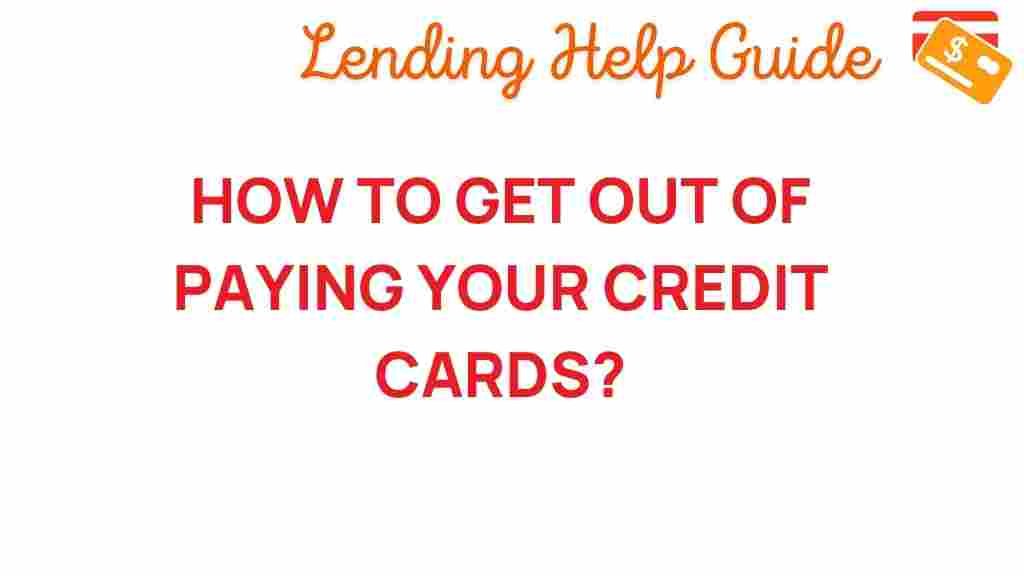Unlocking Freedom: Strategies to Escape Credit Card Debt
Credit card debt can feel like a heavy burden weighing you down, stifling your financial freedom and limiting your ability to enjoy life. However, with the right strategies, you can escape this cycle of debt and regain control of your finances. This article explores effective debt relief strategies, budgeting tips, and payment strategies that will empower you to achieve financial freedom. We’ll also touch on the importance of financial literacy and how it can guide your debt management efforts.
Understanding Credit Card Debt
Credit card debt occurs when you borrow money through a credit card and fail to pay it back within the billing cycle. This can lead to high-interest charges that accumulate rapidly, making it difficult to pay off the original balance. Understanding how credit card debt works is crucial in formulating an effective debt management plan.
Why Financial Freedom Matters
Achieving financial freedom means having control over your finances, allowing you to make choices without being hindered by debt. It enables you to save for the future, invest in opportunities, and enjoy life without the stress of financial obligations. Escaping credit card debt is a significant step toward attaining this freedom.
Step-by-Step Process to Escape Credit Card Debt
To effectively manage and ultimately escape credit card debt, follow these strategic steps:
1. Assess Your Current Financial Situation
Begin by taking stock of your financial situation. Gather all your credit card statements and calculate your total debt. This will give you a clear picture of where you stand.
- List all credit cards and their balances.
- Note the interest rates for each card.
- Calculate your total monthly income and expenses.
2. Create a Budget
Budgeting is a crucial skill in financial literacy that can help you manage your money better. Here’s how to create a budget that prioritizes debt repayment:
- Track your spending for one month to understand where your money goes.
- Identify necessary expenses versus discretionary spending.
- Allocate funds towards debt repayment while ensuring you cover essential costs.
Budgeting tips: Use apps or spreadsheets to keep track of your budget. Regularly review and adjust it as needed.
3. Develop Payment Strategies
Choosing the right payment strategy can accelerate your journey to financial freedom. Here are two popular approaches:
- The Snowball Method: Pay off your smallest debts first. This creates quick wins and motivates you to tackle larger debts.
- The Avalanche Method: Focus on paying off debts with the highest interest rates first, which can save you money in the long run.
Whichever method you choose, make sure to make at least the minimum payments on all your cards to avoid late fees and potential damage to your credit score.
4. Negotiate with Creditors
Don’t hesitate to reach out to your creditors. They may be willing to work with you to lower your interest rates or set up a payment plan. Explain your situation and ask for options that could help you manage your credit card debt better.
5. Consider Debt Relief Options
If your debt feels unmanageable, consider professional debt relief options such as:
- Debt Consolidation: Combine multiple debts into one loan with a lower interest rate.
- Credit Counseling: Work with a certified counselor who can help you create a manageable repayment plan.
- Debt Settlement: Negotiate with creditors to pay a lump sum that is less than your total debt.
Be cautious with these options, as some can impact your credit score. Research thoroughly or speak with a financial advisor before proceeding.
6. Increase Your Income
Increasing your income can significantly help in paying off credit card debt faster. Consider the following options:
- Take on a part-time job or freelance work.
- Sell unused items or assets.
- Explore passive income opportunities.
Apply any extra earnings directly towards your credit card debt to accelerate your repayment process.
7. Maintain Financial Literacy
Building your financial literacy is a powerful tool in managing credit card debt. The more you know, the better decisions you can make. Consider the following:
- Read books and articles on personal finance.
- Attend workshops or online courses.
- Follow reputable financial websites and blogs.
Improving your financial literacy will not only help you escape debt but also prepare you for a financially stable future.
Troubleshooting Common Issues
As you work towards escaping credit card debt, you may encounter common pitfalls. Here are some troubleshooting tips:
- Feeling Overwhelmed: Break your tasks into smaller, manageable steps. Focus on one debt at a time.
- Low Motivation: Set up a reward system. Celebrate small victories to keep yourself motivated.
- Unexpected Expenses: Build an emergency fund to prevent relying on credit cards for unforeseen costs.
Conclusion
Escaping credit card debt is a journey that requires dedication, strategic planning, and a commitment to financial literacy. By assessing your situation, creating a budget, employing effective payment strategies, and seeking debt relief options, you can unlock the freedom that comes with being debt-free. Remember that maintaining a healthy credit score and continuously improving your financial knowledge are essential components of long-term financial management.
For more resources on managing credit card debt, visit Consumer Financial Protection Bureau. Empower yourself with the knowledge and tools necessary to achieve financial freedom.
Start today by taking the first step towards a debt-free life. Your future self will thank you!
This article is in the category Debt and created by LendingHelpGuide Team
